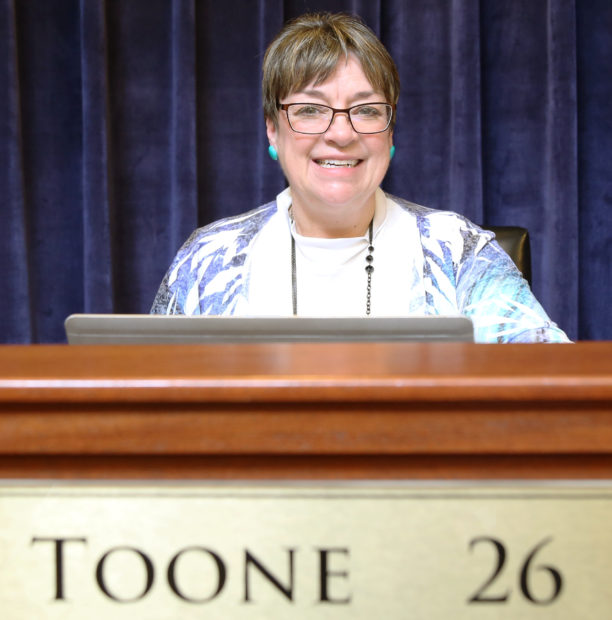Calling it one more tool to remedy Idaho’s teacher shortage, Rep. Sally Toone is taking another run at a loan forgiveness bill for rural teachers.
“We want our next generation to come back and be part of our communities,” Toone, a retired teacher and Gooding Democrat, told the House Education Committee Tuesday morning.
If passed, Toone’s loan forgiveness bill would have a price tag of $1.5 million a year. It would allow up to 500 rural teachers to get a break on their student loans — of up to $3,000 a year for four years — covering at least a fraction of the close to 10,000 teachers and counselors who work in rural districts.

In pushing for her bill, Toone pointed to the need. A growing number of school districts and charters have been forced to go the alternative certification route to fill teaching positions. Even so, said Toone, Idaho schools still left 120 teaching jobs vacant in 2016.
About a dozen states have loan forgiveness laws on the books, Toone said.
House Education didn’t debate Toone’s bill Tuesday; instead, the committee voted unanimously to print the bill. That paves the way, perhaps, for a full hearing on the issue at a later date.
Toone also floated the idea of a loan forgiveness program in 2017, but no bill surfaced. Gubernatorial candidate and state Rep. Paulette Jordan, D-Plummer, is again co-sponsoring the proposal.
Moving quickly Tuesday morning, House Education introduced three other bills without debate:
Mastery education. The State Department of Education wants Idaho to lift the cap on its mastery pilot program — in hopes of allowing more schools to experiment with an approach that advances students based on their command of subject matter, rather than seat time. The SDE is now working with 32 mastery incubator schools in 19 districts. State superintendent Sherri Ybarra is seeking to double the mastery school budget to $2.8 million in 2018-19.
Idaho Reading Indicator. House Education Chair Julie VanOrden has proposed a bill that would strike the IRI from the battery tests that can be used to measure student achievement and growth. The IRI is administered to kindergarten through third-grade students, and it’s designed to identify young students who need extra help in reading. VanOrden, R-Pingree, says this diagnostic test should not be used to assess teacher performance under the career ladder salary law.
Career ladder. The SDE wants to extend the career ladder to cover occupational therapists and physical therapists. This year’s Legislature will consider a $41.7 million installment in the career ladder, a five-year, $250 million plan to boost teacher pay.
Senior math: a thing of the past?
High school seniors might not have to take two semesters of math, if Sen. Steven Thayn has his way.
Thayn, R-Emmett, has proposed a bill that would drop the senior math requirement.
Students would still have to take six semesters of math in order to graduate; they would just have the option of taking care of their requirements sooner.
Administrators for the Boise and Nampa school districts spoke in favor of the bill. Boise math supervisor Teri Thaemert said the senior requirement can cause problems — and not only for students who struggle with math. Some Boise students complete precalculus by the end of their junior year, and then have to find, and pass, two semesters of senior math to make sure they can graduate.
In and of itself, Thayn’s Senate Bill 1266 does nothing. The State Department of Education would have to write a rule dropping the senior requirement, and couldn’t bring this rule to the Legislature until 2019 at the earliest.
The Senate Education Committee passed SB 1266 unanimously. That means the bill could come up for a Senate floor vote later this week.
Coming Wednesday: science standards
After a brief timeout, House Education will take up a proposed slate of new academic science standards Wednesday morning.
Last week, the committee conducted two days of public hearings regarding the standards, a baseline for Idaho’s K-12 public schools and charters. Legislators heard from nearly 30 people Thursday and Friday, and all of them urged the committee to approve the full slate of science standards and not remove references to global warming and human impact on the environment.
The 2018 legislative session actually marks the third consecutive year legislators have considered new science standards. In 2016, legislators quietly rejected standards. In 2017, the Caldwell Republican Rep. Scott Syme and the House Education Committee led action to approve temporary standards after first removing five sections referencing global warming and human impact on the environment.
Those standards are set to expire, which is why legislators are considering standards again.
On Thursday, Syme told Idaho Education News he was preparing action to remove one or two paragraphs, or one standard, from the newest science standards. Syme did not specify which sections he has concerns with.
Wednesday’s meeting is scheduled to begin at 8:30 a.m. in the East Wing’s Room 41 at the Statehouse.
Check back with Idaho Education News on Wednesday for coverage of the meeting.
Idaho Education News reporter Clark Corbin contributed to this report.
